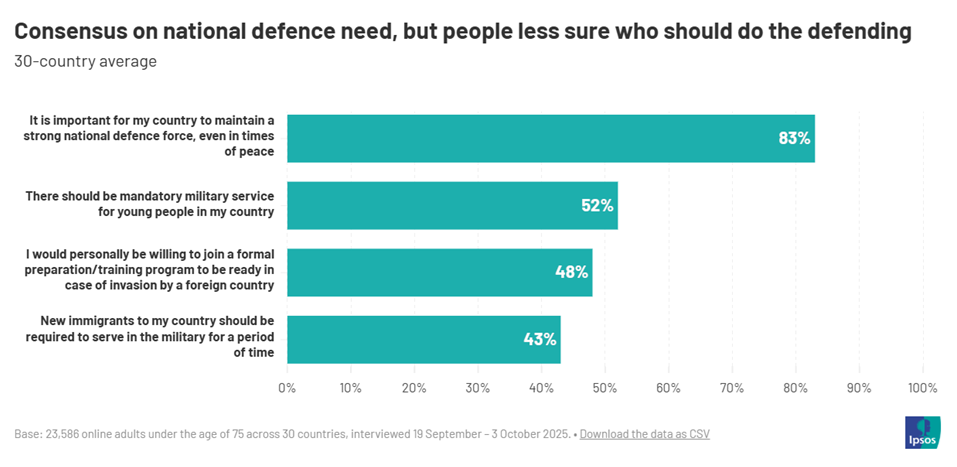

Maintaining a strong national defense force is seen as key by 83%
Having a strong national defense force is seen as vital by most, but who should do the defending proves a more divisive issue.
Ipsos’ annual polling conducted on behalf of the Halifax Security Forum from Sept. 19 and Oct. 3, 2025, finds the vast majority (83% on average across 30 countries, new) agree it’s important for their country to maintain a strong national defense force, even in times of peace.
While national defense is viewed as important just under half (48%, new) say they would personally be willing to join a formal preparation/training program to be ready in case of invasion by a foreign country.
Division on mandatory military service
Meanwhile, opinion on mandatory military service runs the gamut.
We added some questions on the issue as it has recently become a hot topic again with Croatia just reinstating it, Germany debating it and Danish women now facing conscription.
Just over half (52% on average globally and a majority in 16 of 30 countries) support mandatory military service for young people in their country. At a global level, those aged 50-74 (54%) are a bit more supportive of mandatory service for the young than those aged 35-49 (52%) and those under age 35 (49%), while men (55%) are slightly more supportive than women (48%). Malaysians (76%) are the most supportive of this while those in Japan (17%) are least supportive. Around one in three in America (35%) and Canada (31%) support mandatory service for young people.
There’s less support for mandatory service for new immigrants (43% on average globally and a majority in only seven of 30 countries). Singaporeans (68%) are the most in favor of new immigrants to their country being required to serve in the military for a period of time, while the Japanese (22%) are the least supportive. About one-third in both America (35%) and Canada (33%) are in favor of this idea.
https://public.flourish.studio/visualisation/26144724/

Fear about a worldwide conflict levels out
The initial spike in fear after the full-scale invasion of Ukraine in February 2022 has subsided a bit, though global majorities are still worried about a possible World War III.
The proportion of people across 30 countries who expect in the next 25 years we could see another world conflict involving superpowers similar to World Wars I & II stayed stable year-over-year at 62% – but is down from 73% on average globally in 2022.
The proportion of people worried about a possible World War III declined or stayed the same compared to 2024 in 17 countries and rose in 13 countries. Close to two in three in both America (stable at 64%) and Canada (64%, -three pts) are currently worried about a possible World War.
Meanwhile, a new question finds just over half (53% on average across 30 countries) fear that in the next year or so China could take similar actions in Asia that Russia has taken in Ukraine, with South Koreans (76%) the most worried about this. And fairly similar proportion of Americans (57%) and Canadians (54%) are currently concerned about China-Asia relations.
Majority still say the world became more dangerous
And our annual polling conducted on Ipsos’ Global Advisor online platform finds the feeling that the world is more dangerous once again stayed stable at 79% year-over-year, on average across 20 countries* after hitting a record high in 2022 of 86%, but is still up from the record low of 75% in 2018.
In 2025, the proportion of people in America who feel the world became more dangerous over the past year fell six points to 75% and stayed at 82% in Canada, in line with than the 30-country average of 80% (no change versus 2024).
Nuclear attack worries steady
The proportion saying the threat of a nuclear/biological/chemical attack happening somewhere in the world stayed at 72% (on average across 30 countries) year-over-year after spiking nine points to 74%, on average across 20 countries*, in 2022 on the heels of the full-scale invasion of Ukraine. Though it’s important to note 2025 polling was done before U.S. President Donald Trump claimed earlier this month that America could “destroy the world 150 times” with nuclear weapons and before Russian President Vladimir Putin announced Russia had tested a new weapon.
Meanwhile, the perceived threat of terrorist attacks also didn’t budge year-over-year staying at 66%), while concern about personal safety/security violations stayed at 62% and ethnic conflicts in one’s own country barely budged (61%).
And just under half have confidence in their government’s ability to respond to a terrorist attack (stayed stable at 48%), violent conflict between ethnic groups (no change at 48%), armed conflict with another country (stable at 44%) or nuclear attack (stable at 43%).
Just over half support Ukraine continuing to fight
As the full-scale invasion of Ukraine nears the four-year mark majorities in 23 of 30 countries agree Ukraine should fight on until full victory, including expelling Russia from its territory, with support strongest in Sweden (71%, +three pts) and weakest in Japan (stable at 30%). More than half of those in Canada (57%, +4 pts) and the U.S. (53%, no change) support Ukraine fighting on until full victory, just below the 53% global average (-three pts).
Meanwhile, 45% (-two pts) agree the problems in Ukraine are none of their country’s business and they should not interfere. The proportion who agree with this dropped a bit in the U.S. (-five pts to 40%) and Canda (34%, -three pts) compared to last year.
The blame game in the Middle East
Conflict in the Middle East began long before the October 7 attack in 2023 and is an issue that elicits strong and diverging opinions around the world. About mid-way through our polling this year the Gaza peace plan was rolled out on Sept. 29, 2025.
At a global level, 42% (-two pts) agree Muslim people are to blame for instability/conflict in the Middle East but that agreement ranges from 77% (stable) in South Korea to 26% (no change) in New Zealand, while the similar proportions (30%, -four pts) of people in Canada and the U.S. (33%, stable) agree.
A similar proportion (41%, no change) at a global level agree Jewish people are to blame for instability/conflict in the Middle East, with those in Indonesia (76%, no change) the most likely to agree. About one-quarter of Americans (25%, +five pts) and Canadians (26%, no change) agree.
And a new question this year finds just over half (53%) agree that “outside powers such as the U.S. and/or Europe and China are to blame for instability/conflict in the Middle East”.
Support for military spending steady
Meanwhile, support for military spending has risen slightly year-over-year.
Almost three in five (+three pts to 60%) on average globally agree “given the dangers in the world, my government needs to spend more on my country’s military power,” with those in Poland (79%, no change) the most likely to agree and those in Italy the least likely (+three pts to 38%). Support for an increase in military spending dove 10 pts to 45% in the U.S. and rose ten points to 65% in Canada amid Trump’s annexation threats over the past year.
At the same time, the proportion that agree that economic power is more important in world affairs than military power stayed steady at a global level year-over-year at 64% (-two pts). More than half of those in Canada (57%, -one pt) and America (52%, four pts) agree.
*Change for 20-country average is based on the countries which were in all editions of the Ipsos for the Halifax Security Forum report over the past decade.
**BRIC (Brazil, Russia, India, China) and CRINK (China, Russia, Iran, North Korea) countries.
About the Study
These are the results of a 30-country survey conducted by Ipsos on its Global Advisor online platform and, in India, on its IndiaBus platform, between Friday, September 19, and Friday, October 3, 2025. For this survey, Ipsos interviewed a total of 23,586 adults aged 18 years and older in India, 18-74 in Canada, Republic of Ireland, Malaysia, New Zealand, South Africa, Türkiye, and the United States, 20-74 in Thailand, 21-74 in Indonesia and Singapore, and 16-74 in all other countries.
The sample consists of approximately 2,000 individuals in Japan, 1,000 individuals each in Australia, Belgium, Brazil, Canada, France, Germany, Great Britain, Italy, New Zealand, Spain, and the U.S., and 500 individuals each in Argentina, Chile, Colombia, Hungary, Indonesia, Ireland, Malaysia, Mexico, the Netherlands, Peru, Poland, Singapore, South Africa, South Korea, Sweden, Thailand, and Türkiye. The sample in India consists of approximately 2,200 individuals, of whom approximately 1,800 were interviewed face-to-face and 400 were interviewed online.
Samples in Argentina, Australia, Belgium, Canada, France, Germany, Great Britain, Hungary, Italy, Japan, the Netherlands, New Zealand, Poland, South Korea, Spain, Sweden, and the U.S. can be considered representative of their general adult populations under the age of 75. Samples in Brazil, Chile, Colombia, Indonesia, Ireland, Malaysia, Mexico, Peru, Singapore, South Africa, Thailand, and Türkiye are more urban, more educated, and/or more affluent than the general population. The survey results for these countries should be viewed as reflecting the views of the more “connected” segment of their population.
India’s sample represents a large subset of its urban population — social economic classes A, B and C in metros and tier 1-3 town classes across all four zones.
The data is weighted so that the composition of each country’s sample best reflects the demographic profile of the adult population according to the most recent census data. “The Global Country Average” reflects the average result for all the countries and markets in which the survey was conducted. It has not been adjusted to the population size of each country or market and is not intended to suggest a total result.
When percentages do not sum up to 100 or the ‘difference’ appears to be +/-1 percentage point more/less than the actual result, this may be due to rounding, multiple responses, or the exclusion of “don't know” or not stated responses.
The precision of Ipsos online polls is calculated using a credibility interval with a poll where N=1,000 being accurate to +/- 3.5 percentage points and of where N=500 being accurate to +/- 5.0 percentage points. For more information on Ipsos' use of credibility intervals, please visit the Ipsos website.
The publication of these findings abides by local rules and regulations.




